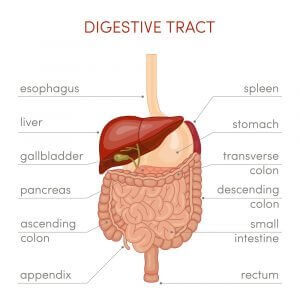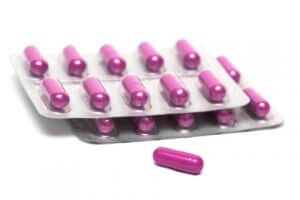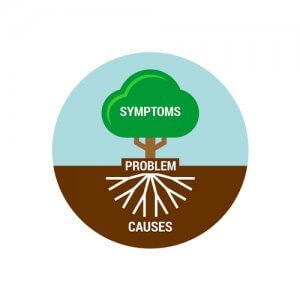What is Acid Reflux / GERD
About sixty million people in the US alone report that they suffer from debilitating acid reflux symptoms at least once a week. This makes acid reflux / GERD one of the most common digestive health conditions. The symptoms of acid reflux / GERD vary and may include:
- Heartburn (burning pain behind the breast bone)
- Abdominal pain
- Regurgitation
- Burping
- Nausea
- Cough
- Sour taste in the mouth
- Sore throat
- Hoarseness
- Laryngitis
- Asthma-like symptoms
- Sinus irritation
And smoking, pregnancy, obesity, hiatal hernia, and even tight-fitting clothes can worsen these symptoms.
Acid reflux occurs when acid and other stomach/intestinal contents (pepsin, bile, bacteria, and pancreatic enzymes) escape into the esophagus and beyond. And chronic acid reflux is often associated with damage because, unlike the stomach, the esophagus, throat, sinus, and lung epithelial surfaces are not protected by a thick mucus layer. As a result, continued reflux can lead to esophagitis, Barrett’s esophagus, and even esophageal cancer.
Persistent damaging reflux is referred to as GERD (Gastroesophageal Reflux Disease). And acid reflux may also cause severe irritation of the throat and vocal cords, a condition referred to as LPR (LaryngoPharyngeal Reflux), and contribute to respiratory issues including asthma and COPD.
Standard Treatments for Acid Reflux / GERD
Acid Reducing Medicines for acid reflux / GERD
Doctors often recommend acid-reducing medicines for acid reflux / GERD treatment, and there are 3 classes of acid-reducing medicines:
- Antacids neutralizing acid
- H2 blockers limiting acid release
- Proton Pump Inhibitors (PPIs) shutting down acid production completely
This pharmaceutical solution is based on the idea that most symptoms and tissue damage are caused solely by stomach acid. However, this is not correct, and the side effects and long-term health risks of acid suppression need to be considered.
 Surgery for acid reflux / GERD
Surgery for acid reflux / GERD
Most commonly known as Nissen Fundoplication and related laparoscopic anti-reflux procedures seek to improve the barrier between the stomach and esophagus by strengthening the LES (Lower Esophageal Sphincter) to prevent reflux. In other words, by pulling up the very top part of the stomach and tightly securing around the esophagus with sutures or by using other procedures (for example, the LINX Reflux Management System, which employs a band of magnetic titanium beads), the LES is tightened or strengthened to prevent reflux.
The downside of these procedures beyond the risks of invasive surgery is a variety of possible side effects, including difficulty belching or vomiting and symptoms of trapped gas.
Dietary Intervention for acid reflux / GERD
The most common dietary advice is to avoid fatty or fried foods, coffee, tea, alcohol, spicy foods, oranges, other citrus fruits, tomatoes, onions, carbonated beverages, chocolate, mint, etc. This anecdotal advice is based on the idea that there is a link between specific “trigger foods” and acid reflux. Yet, a common thread that explains how and why trigger foods cause symptoms has proved elusive. For more information on this topic, please read GERD diet that works without drugs.
Our Integrative and Natural Approach to Acid Reflux / GERD
Dr. Norm’s Focus for Acid Reflux and GERD
His focus is on why acid reflux / GERD occurs in the first place, specifically in your case. What are the primary or contributing underlying causes behind GERD and other digestive health issues in your case?
His goal is to help you stop refluxing instead of masking the symptoms while damage continues. As more control over reflux is established, weaning off H2 blockers and/or PPIs (with your doctor’s consent if prescribed) is part of the process as stomach acid is critical for digestion and absorption of key nutrients, vitamins, and minerals as well as protecting your intestine from incoming pathogens and your lungs from the reflux of intestinal bacteria.
3 Pillar Approach
Dr. Norm uses the following 3 pillar approach in his consultation process:
-
Identifying and addressing underlying or contributing causes that are specific to your case
-
Science-based dietary intervention aimed at understanding your digestive capabilities and optimizing carbohydrate, protein, and fat digestion and absorption
-
Science-based gut-friendly behaviors and practices as well as supplements to optimize digestion and minimize malabsorption
 Identifying and Addressing Underlying Causes
Identifying and Addressing Underlying Causes
Dr. Norm uses science-based risk factor questions to either rule in or out many possible underlying causes. He reviews and analyzes a variety of test results, including but not limited to endoscopy, colonoscopy, blood tests, SIBO tests, comprehensive stool tests, etc.
He may also recommend additional testing to derive meaningful interventions if necessary. Depending upon your specific underlying cause(s), some interventions may involve pharmaceutical or other medical procedures that require you to speak with your primary care doctor or gastroenterologist.
Dietary Intervention
Dr. Norm uses the Fast Tract Diet principles and various other dietary approaches and techniques while accommodating your dietary preferences and practices. He focuses on all 3 food groups, including carbohydrates, proteins, and fats, to aid better digestion and minimize malabsorption.
As part of the dietary intervention, Dr. Norm audits a list of your dietary supplements to ensure that they are helping you, not harming you. He may also recommend a few new dietary supplements based on your specific deficiencies or restorative support.
Aside from addressing acid reflux / GERD, other digestive and general health issues as well as weight loss or weight gain are part of the process.
Gut-Friendly Behaviors and Practices
Although certain behaviors and practices are critical for better digestion and minimize malabsorption, these do not get much attention. But, this is the missing piece. Diligently incorporating the science-based “gut-friendly behaviors and practices” Dr. Norm outlines, you could expand your food faster and easier.
How to make an appointment
Phone
+ 1 (844) 495-1151 US. Our office hours are from Monday to Friday from 8:30 am to 5 pm Eastern Time.
Online Form
Disclaimer
Dr. Norm is a medical microbiologist, not a licensed physician. He provides detailed reports after each consultation, including recommended actions, notes, peer-reviewed journal references, and additional resources. You are welcome to share these materials with your physician or other healthcare providers at your discretion.

 Surgery for acid reflux / GERD
Surgery for acid reflux / GERD Identifying and Addressing Underlying Causes
Identifying and Addressing Underlying Causes